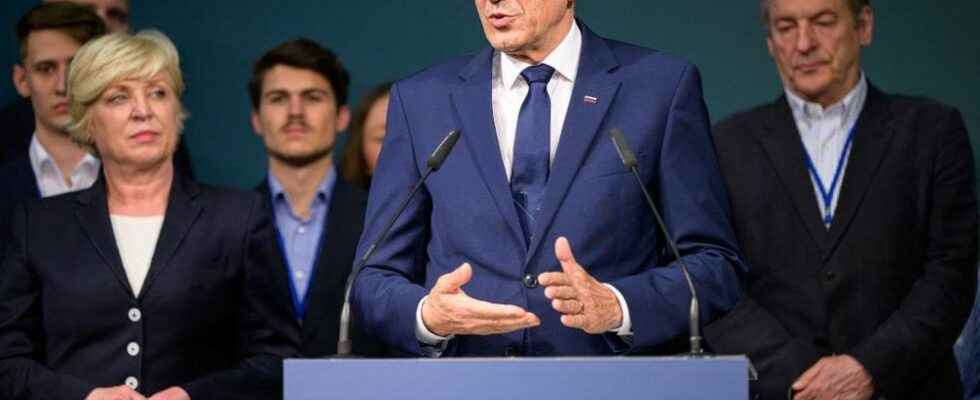A double failure for populists in Europe. Emmanuel Macron’s victory on Sunday against Marine Le Pen in France, and that of environmentalist Robert Golob against controversial outgoing Prime Minister Janez Jansa in Slovenia, constitute a major setback for populist movements across Europe. The sign that “European citizens are attached to the European Union”, explains Jean-Dominique Giuliani, President of the Robert Schuman Foundation.
L’Express: Emmanuel Macron’s victory against Marine Le Pen has caused great relief in Europe. What does it mean for the European project?
Jean-Dominique Giuliani: This is good news, because Emmanuel Macron is undeniably a European leader recognized and appreciated by many Member States. His election was therefore greeted with relief, as the quick reactions of other European leaders showed. Everyone recognizes in him a true vision of Europe. Even if not everyone always agrees with this one, it has the merit of having one.
He wants to move Europe and I think that the end of the French presidency of the Council of the European Union – until June 30 – will result in tangible results, particularly in terms of digital regulation. On April 23, the Member States, the Commission and Parliament reached an agreement on new legislation making it possible to fight more effectively against illegal content online and to better regulate major platforms such as Facebook or Amazon. It is towards this type of progress that the European project must move forward.
Ecologist candidate Robert Golob also won against controversial outgoing Prime Minister Janez Jansa on Sunday in Slovenia. How do you interpret it?
We can speak of a defeat of populism in Europe. Apart from the Polish and Hungarian exceptions, there is no populist victory anywhere. The case of Janez Jansa in Slovenia is interesting: he began his political career in the center right, before drifting towards a hard line, notably supporting Donald Trump, or multiplying provocations against Brussels. What he ended up paying at the ballot box.
Slovenian Prime Minister Janez Jansa delivers a speech after his defeat in the parliamentary elections in Slovenia, April 24, 2022
Jure Makovec / AFP
Is this ebb of populism also linked to the war in Ukraine?
The war in Ukraine played an important role in the vote of many voters. The appetite of populist movements for strong and vertical, even autocratic power, worked against them. And in France, Marine Le Pen could not help but suffer. The French also voted against Vladimir Putin.
But beyond Ukraine, the Covid crisis has undoubtedly also played a role. In France, the policy of “whatever the cost” would for example not have been possible without the European Central Bank and the euro. It may sound technical, but Europeans understand that it is better to be together than alone. The collective and cooperative policy that was put in place during the pandemic – in particular with the grouped orders of vaccines – is a good example of this.
I think that one of the reasons for the decline of populism is precisely in the euroscepticism that it carries with it. It is clear that Marine Le Pen – despite her softening on the question of Frexit – has paid for the fact that she still appears hostile to the European Union.
Marine Le Pen still gained 8 points between 2017 and 2022, to rise to more than 41% of the vote on Sunday. Does his score show a trivialization of the far right in France?
It is indisputable. I think his score can be explained by several factors. First, she continued to de-demonize her party on many issues. The candidacy of Eric Zemmour also made it possible to refocus it. She also took advantage of the wear and tear on Emmanuel Macron’s power, as well as the personal rejection he may have aroused among some voters. But in the end, when all these elements are taken into account, its score of 41% appears relatively modest.
Can we imagine in France in the years to come a scenario comparable to that of Italy, where the League of Matteo Salvini now appears as a party like the others?
It’s hard to say at the moment. It will depend a lot on the political recomposition at work, with a large central body that goes from the center left to the center right, surrounded on both sides by an extreme left bloc and another from the extreme right. The legislative elections will allow us to know more about this point, depending on what Marine Le Pen, Eric Zemmour or Jean-Luc Mélenchon decide to do. All this will recompose the landscape, including on the far right.
How can Europe fight against the rise of populism?
Through its reinforcement and decisions that respond to the concerns of European citizens. A stronger Europe, which delivers tangible and measurable results, is the best remedy against the rise of populism. This was the case during the Covid crisis and we must continue to do so. European policy is the result of compromises and diplomatic decisions that are sometimes difficult to explain. But the results of Sunday’s two elections show that European citizens are attached to the EU, and know that it plays a decisive role in responding to the challenges we face.
